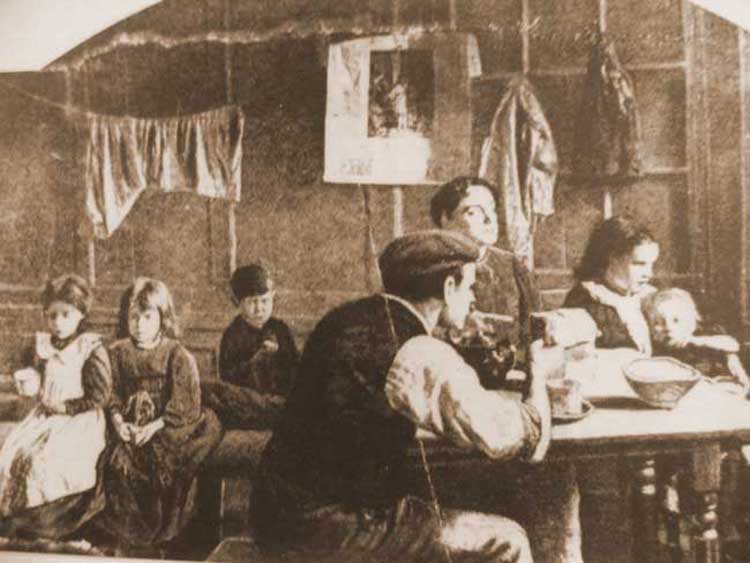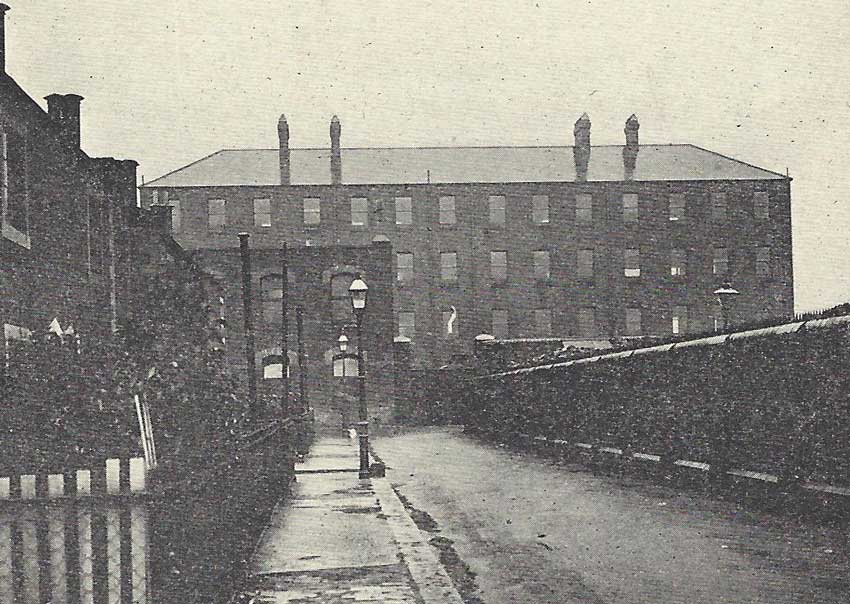Long before the Jack the Ripper murders attracted attention to the grinding poverty that was inherent in the everyday lives of the poor of Whitechapel, newspapers were publishing articles that were critical of the way in which the paupers of the area were treated by officialdom.
The following article appeared in The Pall Mall Gazette on Friday, 6th October, 1882:-
LIFE IN DARK PLACES
“Whitechapel must be a very interesting part of London – more interesting, perhaps, than pleasant to live in.
Too often, when reading of a murder or burglary, we learn that the chief actors have, or have had, their home in, or some connection with, that unfashionable locality; and it becomes an interesting subject of speculation how closely these vices can be connected with the facts that parliamentary Blue-books tell of houses where seven or eight persons sleep in one room, for which four or five shillings a week is often demanded, and where, in addition to the human inhabitants, fowls live and flourish, decency and civilization being ejected as tenants for whose accommodation there is no room.
The guardians of the poor in Whitechapel have duties of administration which higher boards might shrink from; and the reports lately issued by that body and printed by Messrs. Penny and Hull, of Leman-street, are well worthy of more than cursory consideration.
They are the reports of men who are doing their work, not as relief administrators only, but as educators.

OUT RELIEF HAS BEEN ABOLISHED
Their aim seems not to be to keep the rates down (though that is a matter not ignored in their minds) but to increase the general good and happiness.
With this view, they have practically abolished out-relief.
It was found impossible so to administer the dole that it should be productive of gratitude and self-dependence. It appeared to produce only greed, falsehood, and idleness. It was therefore abolished, some of the guardians by private means or influence taking care that kindly charity should always be at hand to meet those cases of undeserved distress and to provide for the old age of the moral aristocracy among the poor.
LIFE IN THE WORKHOUSE
Out-relief absorbing but little attention, it is to the system of the treatment of indoor paupers that the guardians can devote their thought.
They have aimed at making the workhouse an “industrial training school.”
In the words of the report, “their desire being to provide employment suitable to the physical ability of every pauper, whether able-bodied or not; to make such employment, in the case of the able-bodied, an adequate test of destitution, and to substitute, as far as possible, useful and remunerative labour for such degrading and unprofitable work as stone-breaking and oakum-picking.”

THE WORK OF THE PAUPERS
In carrying out this policy of workhouse administration the guardians have been admirably seconded by the master, as is evidenced by the results.
The male paupers have been employed in wood chopping, sawing and bundling, coffee grinding, mat making, horsehair picking, pannikin and kitchen utensil making (out of disused Australian meat tins), coffin making, carpentering whitewashing, bricklaying, painting and graining, glazing, chimney sweeping, shoemaking, tailoring, pumping, gardening, &c.
The female paupers have been employed in household work, washing and laundry work, flock picking, horsehair picking, and needlework, including much of the work required for the infirmary.
THE ARTICLES MADE
The articles actually made and work done during the half-year were as follows:- 258 coffins, 179 mats, 1,o5o pannikins, 100 paint-cans and other utensils made; 103,500 bundles of wood sawn, cut, and made up (in addition to 125 bags of chips and 85 bags of sawdust); 8 tons of coffee and 6 1/2 quarters of peas ground; 452 flock beds and 281 flock pillows picked,the ticks being washed and refilled; 600 pounds of horsehair picked; 990 pairs of shoes, 8o6 pairs of trousers, 204 vests, and 181 jackets repaired; the female labour department showing an aggregate result of 2,806 articles of clothing made, 14,098 repaired, and 66,669 washed, &c.”
Not a bad tale of work to have been accomplished by the number of inmates – 277 – even without taking into consideration the great age and capacity, or rather the want of it, of the majority of the workers.
The sight of this workhouse, with its gardens and busy work-shops, would be a not unwelcome surprise to those who are accustomed to see only the dreary gangs of stonebreakers in the yard or the “got-no work-to-do” attitudes on the female side of the house.
THE MENTAL INSTRUCTOR
In the Whitechapel Workhouse, the “mental instructor” (a name that smacks of Whitechapel originality), gathers these same inmates around him for an hour, after the frugal dinner.
“The effect has been that assistance has been given in the preservation of the good order and discipline of the paupers by the restraint upon language and conduct during hours when the men are comparatively free from official supervision;” while the mental instructor himself appears to have been largely successful in making the evening engagements interesting as well as useful.
THE BOYS SENT TO WORK
Another experiment has been made with respect to the boys who have been brought up in the schools belonging to the union.
Under the old plan, these lads were launched into the world as apprentices.
But the system did not work well; the apprenticeship kept alive the memory of the pauperism, and did not secure the care of the best tradesmen.
Now the boys are sent at fourteen, or when fit to work, to a lodging-house home.
Thus they take their place with other boys, going out to work, making the home their hotel or club-house, and meeting the first waves of the world in, as it were, a harbour, and yet without cork belts.
THE SYSTEM FOR THE GIRLS
With the girls, a similar system is in vogue, excepting that the girls go to a little training home, where but four are taken at a time, and there they learn, not only the ways of an ordinary refined household, but the countless facts of life which it requires some stretch of imagination to conceive any one to be ignorant of; such things as the value of money and the use of a frying pan.
Perfect as the machinery and organization often are in the pauper schools, still with such large numbers, such little matters are perforce left out of account in the education of a pauper-bred child.
PHILANTHROPY FOR THE WORK
These guardians seem to have an unusual power of attracting philanthropy to their service, the secret being, perhaps, that they are not jealous, nor fearful of recognizing the unofficial and unpaid labour.
The ladies who visit the workhouse and infirmary for the purpose of helping young women to shake off the bonds of pauperism and vice and earn honest livelihoods, have a recognized place in the administration.
The board seem to touch many sides of this strange Whitechapel life, and to touch it with a wisdom which, joined to time, must produce success.
NEGOTIATIONS WITH THE LOCAL BOARD
The tale of their progress is now and then broken by negotiations with the Local Government Board concerning boarding out, negotiations which do not seem to go quite so smoothly as could be wished.
In one case “a personal visit was rendered imperatively necessary to the adjustment of differences,” and there was no one to pay this delicate visit but the clerk or such of the guardians as would volunteer for the distasteful duty.
A MASTERLY INACTION
This and similar difficulties have induced these wise men of the East to communicate frequently with their superior Board, laying before them the facts, with a request that some steps should be taken for the appointment of this “close and sympathetic inspector.”
The Local Government Board meet resolutions and deputations alike with masterly inaction.
But, with so many irons in the fire, and so much good work progressing, the Whitechapel guardians can afford to give patience, in the consciousness that in all other branches of their labours they are more the objects of congratulation than condolence.”
